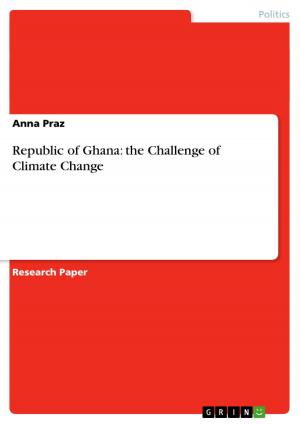Capital Account Liberalization
Nonfiction, Social & Cultural Studies, Political Science, Politics, Economic Policy| Author: | Christoph Yew | ISBN: | 9783640233489 |
| Publisher: | GRIN Publishing | Publication: | December 16, 2008 |
| Imprint: | GRIN Publishing | Language: | English |
| Author: | Christoph Yew |
| ISBN: | 9783640233489 |
| Publisher: | GRIN Publishing |
| Publication: | December 16, 2008 |
| Imprint: | GRIN Publishing |
| Language: | English |
Diploma Thesis from the year 2008 in the subject Business economics - Economic Policy, grade: 2.0, University of Osnabrück (Fachbereich Außenwirtschaft), 90 entries in the bibliography, language: English, abstract: During the recent decades, many countries decided to get access to international financial markets by liberalizing their capital accounts. As we will see in this paper, the issues of liberalization are very complex. Many different areas like, for example, growth, inflation or the labor market are affected by it. For some areas, empirical research supports theory and delivers sustainable and significant results. For others, theory is inconsistent or not supported by evidence from the real world. Some special ones, like for instance welfare or productivity, even show that it is important to split up the results to see whose welfare is increased or which's branch productivity is affected. Another interesting point is the connection between crises and capital account liberalization. Due to the financial crises that occurred in the aftermath of liberalization the concept has been controversially debated by academics for a long time. The real connection between these two issues is not yet clear. The structure of this paper is as follows. Section 2 will give short case studies of countries that liberalized their capital account. Section 3 is meant to endow the reader with some basic tools that will be important for the understanding of the concepts that will be presented later on in this paper. This includes definitions and conceptual ideas about measuring capital account liberalization. Section 4 focuses on the theory and empirical findings. In that section, the effects of liberalization on various macroeconomic variables will be presented. Section 5 follows the thoughts of the prior one by having a look at the implications that can be concluded from the theoretical and empirical findings that have been presented in the prior chapter. Section 6 discusses capital account liberalization with respect to the role the IMF played concerning its promotion. This section will also discuss the development of the Fund's stance towards liberalization. Section 7 will conclude.
Diploma Thesis from the year 2008 in the subject Business economics - Economic Policy, grade: 2.0, University of Osnabrück (Fachbereich Außenwirtschaft), 90 entries in the bibliography, language: English, abstract: During the recent decades, many countries decided to get access to international financial markets by liberalizing their capital accounts. As we will see in this paper, the issues of liberalization are very complex. Many different areas like, for example, growth, inflation or the labor market are affected by it. For some areas, empirical research supports theory and delivers sustainable and significant results. For others, theory is inconsistent or not supported by evidence from the real world. Some special ones, like for instance welfare or productivity, even show that it is important to split up the results to see whose welfare is increased or which's branch productivity is affected. Another interesting point is the connection between crises and capital account liberalization. Due to the financial crises that occurred in the aftermath of liberalization the concept has been controversially debated by academics for a long time. The real connection between these two issues is not yet clear. The structure of this paper is as follows. Section 2 will give short case studies of countries that liberalized their capital account. Section 3 is meant to endow the reader with some basic tools that will be important for the understanding of the concepts that will be presented later on in this paper. This includes definitions and conceptual ideas about measuring capital account liberalization. Section 4 focuses on the theory and empirical findings. In that section, the effects of liberalization on various macroeconomic variables will be presented. Section 5 follows the thoughts of the prior one by having a look at the implications that can be concluded from the theoretical and empirical findings that have been presented in the prior chapter. Section 6 discusses capital account liberalization with respect to the role the IMF played concerning its promotion. This section will also discuss the development of the Fund's stance towards liberalization. Section 7 will conclude.















